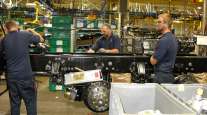VW Diesel Settlement Possible Boon for Heavy-Duty Truck, Engine Manufacturers

Volkswagen AG’s diesel emission scandal may be one of the best things to happen to American air quality.
The German carmaker’s recent legal settlement with states, territories and tribes for cheating on pollution tests requires VW to pay $2.7 billion into an “environmental remediation fund" aimed at cleaning up the damage its cars have done. That could mean grants for new school buses, upgraded port facilities and cleaner tractor-trailers.
“This won’t solve the problem of older, high-polluting, legacy diesel vehicles — but it should take a big chunk out of it and result in cleaner air for all," said Paul Billings, senior vice president for advocacy for the American Lung Association.
Several companies stand to gain from the influx of money: Engine makers and truck producers such as Cummins Inc., Caterpillar Inc., Peterbilt Motors Co. and Volvo AB have benefited in the past from federal funding to build environmentally friendly trucks or upgrade older vehicles’ engines.
“Cummins has helped many school districts and municipalities modernize their bus and truck fleets improving fuel efficiency and reducing their environmental impact,” said Jon Mills, external communication director for Cummins. “The settlement will provide additional resources for these efforts.”
The VW money will be distributed by a trust to be established in late summer or early fall, after the judge overseeing the case formally signs off on the agreement. VW will then make three annual payments of $900 million. The trust agreement specifies 10 possible project areas for which the money can be used.
States will be able to request money based on how many tainted VW cars were registered in the jurisdiction, according to Phil Brooks, director of the Environmental Protection Agency’s office of civil enforcement.
California will get the most: about $381 million, according to court documents. At the other end of the spectrum will be Puerto Rico, the District of Columbia and a handful of states, each getting $7.5 million.
Mary Nichols, head of California’s Air Resources Board, said the state will probably use its money to replace older school buses in rural communities and continue to upgrade infrastructure at rail yards and ports. For example, the state has beefed up shore power at some ports so barges don’t need to keep their diesel engines running.
"We want the money to go where the quality of the air is the biggest problem," she said. "It’s a lot of money, but we weren’t out to destroy them. We didn’t cut them any slack but we are allowing them to, if they can, fix a lot of vehicles."
There is no way to truly know if the settlement will be enough to offset the additional emissions VW put in the air during the years the company deceived regulators, said Frank O’Donnell, president of nonprofit advocacy organization Clean Air Watch.
"We sort of have to take it at good faith that it will be enough," O’Donnell said. "It’s safe to say that the settlement should bring about cleaner air, less pollution-related disease and less premature deaths."
In 2000, the EPA adopted regulations that would cap the amount of nitrogen oxide 2007 model vehicles and beyond could emit. Nitrogen oxide combines with oxygen, contributing to acid rain and asthma, according to the EPA. More than half the buses on the road don’t meet that guideline.
For years, VW baffled the automobile world with diesel cars that appeared to meet emissions standards without compromising performance or using costly equipment that competitors relied on. The automotive wonders were actually too good to be true: VW admitted in September that since 2009, it had rigged cars to pass the EPA’s and California’s emissions tests. In some cases, VW cars were admitting 40 times as much nitrogen oxide as permitted.
The company still faces a criminal investigation in the U.S. but has reached a civil settlement of more than $15 billion. Of that, $10.03 million will go directly to buying back cars at pre-scandal prices and paying the drivers up to $10,000 to get them to turn in the vehicles or get them modified if a fix can be worked out. Another $2 billion over 10 years will be used to promote cars powered by hydrogen and electricity.
The $2.7 billion trust is on top of projects the federal government already funds under the Diesel Emissions Reduction Act, known as DERA. The EPA says it will award $26 million worth of DERA grants in 2016 to replace or upgrade old diesel vehicles. The agency said more than 73,000 older diesel engines have been upgraded or replaced through the program since 2008.
“There’s a whole variety of remediation projects” the $2.7 billion from VW could go to, said Allen Schaeffer, executive director for the Diesel Technology Forum, a nonprofit whose members include VW, General Motors Co. and Caterpillar Inc.
Schaeffer said around 60% of the trucks in the U.S. do not meet the 2007 emissions guidelines. “One of the great opportunities is the rapid turnover of heavy-duty trucks,” he said.
Investing in the air quality would have the biggest impact if the funds target the places in the most need, said Chris Miller, executive director of the Advanced Engine Systems Institute, a trade association of manufacturers.
"In some of the really populated urban pockets, I think this could make a huge, huge contribution," Miller said.




